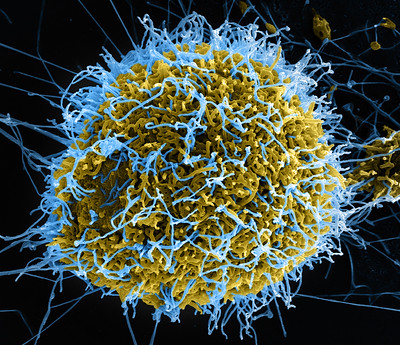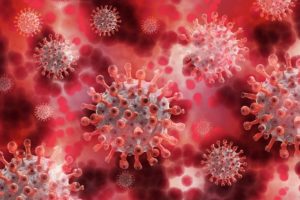COVID-19 and the Gut Microbiome
February 11, 2022
EFFECTS OF MICROBIOMES

The importance of the immunomodulatory effects of gut microbial populations has now been well recognized. In addition to their normal beneficial effects, alterations in the gut microbiota composition can lead to profound immune dysregulation and systemic inflammation. Because severe COVID-19 and long term COVID are driven by inappropriate immune activities and systemic inflammation, it is reasonable to hypothesize that the composition of the gut microbiome might be an important determinant of disease severity and duration. It is also possible that the disease could be affecting the gut microbiome. An increasing body of evidence is consistent with both possibilities, which are not mutually exclusive. Let’s look at some of the recent studies on these issues.
There are several aspects of the relationships between COVID-19 and gut dysbiosis. There is an increasing body of evidence that infection with SARS-CoV-2 affects the gut microbiome, resulting either from a direct infection or from the dysregulated immune response that is a hallmark of severe COVID-19.
Certainly, there is evidence that SARS-CoV-2 can infect gut tissue, although COVID-19 is not always associated with gastrointestinal symptoms. Such evidence includes shedding of viral RNA in stool samples and the ability of the virus to infect gut enterocytes in vitro. In a mouse model, the gut microbiome affects the expression of ACE2, the SARS-CoV-2 receptor, in the gut. There are ample data showing imbalances in gut microbiota following infection. Furthermore, the degree of microbiome dysbiosis appears to correlate with disease severity, although again which is cause and which is effect is not totally clear. However, dysbiosis also appears to be associated with long COVID symptoms, and it is not clear whether or not this is associated with viral persistence. Interestingly, persistent respiratory symptoms were associated with the presence of opportunistic gut pathogens while fatigue was associated with hospital-acquired gut pathogens. There was an inverse correlation of symptoms with the presence of beneficial butyrate-producing bacteria. Short chain fatty acids, such as butyrate, increased regulatory T cell numbers and dampened inflammatory responses.
MECHANISMS
If, as seems likely, gut dysbiosis is contributing to COVID severity and duration, what might be the mechanisms? This could be through communication with the respiratory tract immune system via soluble molecules; indeed, such molecules that are produced by bacteria or by gut lymphoid tissue can cross the intestinal barrier and exert systemic activities. As mentioned above, bacterially-produced short chain fatty acids from beneficial bacteria are anti-inflammatory, so the lack of these bacteria might result in inflammatory damage to the gut, causing it to leak its contents. Indeed, a comparison of bloodstream infections in COVID-19 patients with paired gut microbiome data suggested the leakage of bacteria from the gut into the systemic circulation, enabling secondary infections and exacerbating or prolonging COVID-19. A second study reported similar results indicating leakage from the gut in patients hospitalized with COVID-19. Bacterial lipopolysaccharide (LPS) level in the blood was two times higher in these patients than in healthy controls, further indicating bowel leakage. Plasma LPS is strongly pro-inflammatory. Thus, it seems that the lack of beneficial bacteria (and their important short chain fatty acids) and gut leakage from bacteria that favor inflammation are two mechanisms that increase disease severity and duration in COVID-19.
TREATMENT

What might all this mean regarding treatment or prevention of COVID-19? Potential interventions to restore a normal microbiome could include probiotics, prebiotics, or even fecal transplants. There are no clear current data on the effect of probiotics or prebiotics on COVID-19. There is, however, an anecdotal study that showed rapid resolution of COVID-19 in two high risk patients who were treated with fecal transplants because of C. difficile infections.
CONCLUSION
What conclusions can be drawn from the above studies? It seems likely that infection with SARS-CoV-2 does affect the gut microbiome, by direct infection and/or immune dysregulation. An altered gut microbiota result in disrupted gut barrier integrity, and thus, gut symptoms have consistently been associated with more severe illness in COVID-19 patients. Certainly, the potential impact of the pandemic on gut microbiome research is significant. Further comprehensive research on the role of microbiomes in COVID-19 and long COVID, with demographically diverse patient populations, will be beneficial for the identification of biomarkers and the development of diagnostics by testing for a leaky gut and fecal viral loads.
References
- Chen, Y., et al., The presence of SARS-CoV-2 RNA in the feces of COVID-19 patients. J Med Virol, 2020. 92(7): p. 833-840.
- Lamers, M.M., et al., SARS-CoV-2 productively infects human gut enterocytes. Science, 2020. 369(6499): p. 50-54.
- Koester, S.T., et al., Variability in digestive and respiratory tract Ace2 expression is associated with the microbiome. PLoS One, 2021. 16(3): p. e0248730.
- Ren, Z., et al., Alterations in the human oral and gut microbiomes and lipidomics in COVID-19. Gut, 2021. 70(7): p. 1253-1265.
- Zuo, T., et al., Depicting SARS-CoV-2 faecal viral activity in association with gut microbiota composition in patients with COVID-19. Gut, 2021. 70(2): p. 276-284.
- Zuo, T., et al., Alterations in Gut Microbiota of Patients With COVID-19 During Time of Hospitalization. Gastroenterology, 2020. 159(3): p. 944-955 e8.
- Yeoh, Y.K., et al., Gut microbiota composition reflects disease severity and dysfunctional immune responses in patients with COVID-19. Gut, 2021. 70(4): p. 698-706.
- Chen, Y., et al., Six-month follow-up of gut microbiota richness in patients with COVID-19. Gut, 2022. 71(1): p. 222-225.
- Liu, Q., et al., Gut microbiota dynamics in a prospective cohort of patients with post-acute COVID-19 syndrome. Gut, 2022.
- Goncalves, P., J.R. Araujo, and J.P. Di Santo, A Cross-Talk Between Microbiota-Derived Short-Chain Fatty Acids and the Host Mucosal Immune System Regulates Intestinal Homeostasis and Inflammatory Bowel Disease. Inflamm Bowel Dis, 2018. 24(3): p. 558-572.
- Venzon, M., et al., Gut microbiome dysbiosis during COVID-19 is associated with increased risk for bacteremia and microbial translocation. Res Sq, 2021.
- Prasad, R., et al., Plasma microbiome in COVID-19 subjects: an indicator of gut barrier defects and dysbiosis. bioRxiv, 2021: p. 2021.04.06.438634.
- Kumar, P. and B. Chander, COVID 19 mortality: Probable role of microbiome to explain disparity. Med Hypotheses, 2020. 144: p. 110209.
- Bilinski, J., et al., Rapid resolution of COVID-19 after faecal microbiota transplantation. Gut, 2022. 71(1): p. 230-232.
COVID-19 and the Gut Microbiome
February 11, 2022
Effects of Microbiomes
The importance of the immunomodulatory effects of gut microbial populations has now been well recognized. In addition to their normal beneficial effects, alterations in the gut microbiota composition can lead to profound immune dysregulation and systemic inflammation. Because severe COVID-19 and long term COVID are driven by inappropriate immune activities and systemic inflammation, it is reasonable to hypothesize that the composition of the gut microbiome might be an important determinant of disease severity and duration. It is also possible that the disease could be affecting the gut microbiome. An increasing body of evidence is consistent with both possibilities, which are not mutually exclusive. Let’s look at some of the recent studies on these issues.
There are several aspects of the relationships between COVID-19 and gut dysbiosis. There is an increasing body of evidence that infection with SARS-CoV-2 affects the gut microbiome, resulting either from a direct infection or from the dysregulated immune response that is a hallmark of severe COVID-19.
Certainly, there is evidence that SARS-CoV-2 can infect gut tissue, although COVID-19 is not always associated with gastrointestinal symptoms. Such evidence includes shedding of viral RNA in stool samples and the ability of the virus to infect gut enterocytes in vitro. In a mouse model, the gut microbiome affects the expression of ACE2, the SARS-CoV-2 receptor, in the gut. There are ample data showing imbalances in gut microbiota following infection. Furthermore, the degree of microbiome dysbiosis appears to correlate with disease severity, although again which is cause and which is effect is not totally clear. However, dysbiosis also appears to be associated with long COVID symptoms, and it is not clear whether or not this is associated with viral persistence. Interestingly, persistent respiratory symptoms were associated with the presence of opportunistic gut pathogens while fatigue was associated with hospital-acquired gut pathogens. There was an inverse correlation of symptoms with the presence of beneficial butyrate-producing bacteria. Short chain fatty acids, such as butyrate, increased regulatory T cell numbers and dampened inflammatory responses.
Mechanisms
If, as seems likely, gut dysbiosis is contributing to COVID severity and duration, what might be the mechanisms? This could be through communication with the respiratory tract immune system via soluble molecules; indeed, such molecules that are produced by bacteria or by gut lymphoid tissue can cross the intestinal barrier and exert systemic activities. As mentioned above, bacterially-produced short chain fatty acids from beneficial bacteria are anti-inflammatory, so the lack of these bacteria might result in inflammatory damage to the gut, causing it to leak its contents. Indeed, a comparison of bloodstream infections in COVID-19 patients with paired gut microbiome data suggested the leakage of bacteria from the gut into the systemic circulation, enabling secondary infections and exacerbating or prolonging COVID-19. A second study reported similar results indicating leakage from the gut in patients hospitalized with COVID-19. Bacterial lipopolysaccharide (LPS) level in the blood was two times higher in these patients than in healthy controls, further indicating bowel leakage. Plasma LPS is strongly pro-inflammatory. Thus, it seems that the lack of beneficial bacteria (and their important short chain fatty acids) and gut leakage from bacteria that favor inflammation are two mechanisms that increase disease severity and duration in COVID-19.
It seems that the lack of beneficial bacteria (and their important short chain fatty acids) and gut leakage from bacteria that favor inflammation are two mechanisms that increase disease severity and duration in COVID-19.
There is an increasing body of evidence that infection with SARS-CoV-2 affects the gut microbiome, resulting either from a direct infection or from the dysregulated immune response that is a hallmark of severe COVID-19.
It seems likely that infection with SARS-CoV-2 does affect the gut microbiome, by direct infection and/or immune dysregulation.
 Treatment
Treatment
What might all this mean regarding treatment or prevention of COVID-19? Potential interventions to restore a normal microbiome could include probiotics, prebiotics, or even fecal transplants. There are no clear current data on the effect of probiotics or prebiotics on COVID-19. There is, however, an anecdotal study that showed rapid resolution of COVID-19 in two high risk patients who were treated with fecal transplants because of C. difficile infections.
Conclusion
What conclusions can be drawn from the above studies? It seems likely that infection with SARS-CoV-2 does affect the gut microbiome, by direct infection and/or immune dysregulation. An altered gut microbiota result in disrupted gut barrier integrity, and thus, gut symptoms have consistently been associated with more severe illness in COVID-19 patients. Certainly, the potential impact of the pandemic on gut microbiome research is significant. Further comprehensive research on the role of microbiomes in COVID-19 and long COVID, with demographically diverse patient populations, will be beneficial for the identification of biomarkers and the development of diagnostics by testing for a leaky gut and fecal viral loads.
References
- Chen, Y., et al., The presence of SARS-CoV-2 RNA in the feces of COVID-19 patients. J Med Virol, 2020. 92(7): p. 833-840.
- Lamers, M.M., et al., SARS-CoV-2 productively infects human gut enterocytes. Science, 2020. 369(6499): p. 50-54.
- Koester, S.T., et al., Variability in digestive and respiratory tract Ace2 expression is associated with the microbiome. PLoS One, 2021. 16(3): p. e0248730.
- Ren, Z., et al., Alterations in the human oral and gut microbiomes and lipidomics in COVID-19. Gut, 2021. 70(7): p. 1253-1265.
- Zuo, T., et al., Depicting SARS-CoV-2 faecal viral activity in association with gut microbiota composition in patients with COVID-19. Gut, 2021. 70(2): p. 276-284.
- Zuo, T., et al., Alterations in Gut Microbiota of Patients With COVID-19 During Time of Hospitalization. Gastroenterology, 2020. 159(3): p. 944-955 e8.
- Yeoh, Y.K., et al., Gut microbiota composition reflects disease severity and dysfunctional immune responses in patients with COVID-19. Gut, 2021. 70(4): p. 698-706.
- Chen, Y., et al., Six-month follow-up of gut microbiota richness in patients with COVID-19. Gut, 2022. 71(1): p. 222-225.
- Liu, Q., et al., Gut microbiota dynamics in a prospective cohort of patients with post-acute COVID-19 syndrome. Gut, 2022.
- Goncalves, P., J.R. Araujo, and J.P. Di Santo, A Cross-Talk Between Microbiota-Derived Short-Chain Fatty Acids and the Host Mucosal Immune System Regulates Intestinal Homeostasis and Inflammatory Bowel Disease. Inflamm Bowel Dis, 2018. 24(3): p. 558-572.
- Venzon, M., et al., Gut microbiome dysbiosis during COVID-19 is associated with increased risk for bacteremia and microbial translocation. Res Sq, 2021.
- Prasad, R., et al., Plasma microbiome in COVID-19 subjects: an indicator of gut barrier defects and dysbiosis. bioRxiv, 2021: p. 2021.04.06.438634.
- Kumar, P. and B. Chander, COVID 19 mortality: Probable role of microbiome to explain disparity. Med Hypotheses, 2020. 144: p. 110209.
- Bilinski, J., et al., Rapid resolution of COVID-19 after faecal microbiota transplantation. Gut, 2022. 71(1): p. 230-232.
